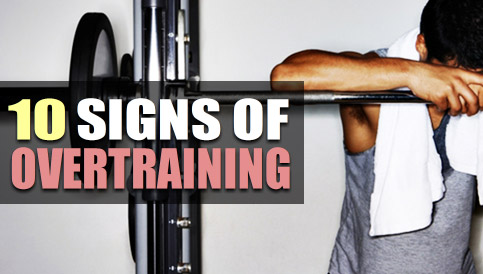“AM I OVERTRAINING?” – 10 SIGNS YOU’RE TRAINING TOO HARD

You train hard in the gym and take your workouts seriously.
After all, you’re motivated and driven to reach your fitness goals, and the more time and effort you put into something, the better results you’ll achieve.
Right?
Well, not exactly.
Unlike most other areas of life, bodybuilding and fitness work a bit differently.
If you’re trying to build muscle, gain strength, and lose body fat, there comes a point where doing more does not necessarily lead to improved progress.
In fact, going overboard with your weekly training volume and intensity can eventually become directly counterproductive, leading you into a state of “overtraining” and ultimately doing more harm than good.
What Is Overtraining? Is It Real Or Just A Myth?

Contrary to what some fitness experts will tell you, overtraining is not simply a “myth.”
Though it does require a fairly high workload in order to truly reach an overtrained state, it most definitely is a real phenomenon that can affect lifters in various ways.
Temporary periods of what is known as “overreaching” can be strategically used by more advanced lifters when implemented properly (or training methods such as rest-pause training where you use failure effectively). But chronic overtraining is always something that should be avoided.
1) Overreaching: An accumulation of training and/or non-training stress resulting in short-term decrement in performance capacity, with or without related physiological and psychological signs and symptoms of overtraining, in which restoration of performance capacity may take several days to several weeks.
2) Overtraining: An accumulation of training and/or non-training stress resulting in long-term decrement in performance capacity, with or without related physiological and psychological signs and symptoms of overtraining, in which restoration of performance capacity may take several weeks or months.
Source: https://www.ncbi.nlm.nih.gov/pubmed/15571428
So, during both overreaching and overtraining, you’ve stressed your body to a greater extent than it can properly recover from.
Overreaching is typically done over a short term period in order to intentionally over-stress the body for greater long term gains. Overtraining involves a longer term, unintentional over-stressing period carried out for an excessive length of time that is directly counterproductive to size and strength gains as well as physical and mental health.
Remember that the basic logic of resistance training is to place the body under stress and then allow it to recover and grow larger and stronger as an adaptive response.
Recovery itself IS growth, and if the stress you’re generating in the gym is consistently too high, you won’t be able to achieve progress at your full potential. Or even worse, you’ll stagnate altogether or even regress.
On top of that, spending more hours in the gym than you really need to is simply a waste of time and energy that could be saved and diverted to other areas of your life instead.
10 Overtraining Symptoms To Look Out For

“Am I overtraining?”
This is the question you might be asking yourself.
Well, if your progress in the gym has clearly stagnated and you just aren’t feeling 100% both physically and mentally, here are 10 of the most common overtraining symptoms you’ll want to look out for…
#1 – Your strength levels have stagnated or are steadily decreasing.
One of the first and main red flags of overtraining is a decrease in lifting strength.
It’s totally normal to have an “off session” every once in a while, but if your nutrition and sleep are on point and you’re still finding it impossible to add more weight to the bar (or your performance is actually decreasing), there’s a chance that your weekly training workload is simply too high.
Remember that as you become more advanced and are lifting heaver and heavier loads, the total stress on your body will also be steadily increasing. This applies not just to your muscles, but to your joints and central nervous system as well.
Squatting 3 plates a side is much more demanding than 2 plates or 1 plate, so as you progress to greater weights you also need to carefully monitor your training volume and frequency to ensure you’re getting adequate recovery time.
#2 – You feel burned out and overly fatigued midway through your workouts.
If your training sessions were previously smooth-sailing but you’re now finding it difficult to complete all of your assigned exercises and sets, this is another sign that your body is simply over-stressed and needs a break.
Again, an “off day” here and there is no big deal, but if you find yourself constantly yawning throughout your workout and feeling slow, sluggish and lethargic, it’s probably time to hit the brakes a bit.
#3 – You feel generally tired throughout the day.
The increase in fatigue doesn’t need to be limited to the gym only.
If you’re having a harder time getting out of bed and your energy levels and focus have clearly declined in comparison to what they were before, this is another possible sign of overtraining that you’ll want to look out for.
Overtraining can also lead to increases in anxiety and depression, especially in those who are already prone to it.
#4 – You’re getting sick more often.
Overtraining increases the circulation of cortisol, which is a powerful stress hormone within the body.
While short rises and falls in cortisol are usually no big deal, chronic elevations can lead to inflammation and can decrease the strength of your immune system.
So, if you find yourself feeling under the weather more often than usual, this can be another tell-tale sign that your body is over-stressed and not properly recovering in between workouts.
#5 – Your joints are constantly aching.
Little aches and pains are fairly common from time to time in most serious lifters and may not be a cause for concern, but chronically sore joints that won’t subside can definitely be a symptom of overtraining.
This happens because overtraining increases inflammation in the body which can lead to pain, stiffness, redness, swelling, and make your joint warm to the touch.
Don’t over-look this, as maintaining adequate joint health is extremely important and is a limiting factor in your fitness program. After all, it doesn’t matter how strong your muscles are; if the foundation is weak and can’t support the weights you’re lifting, your entire training routine will be held back.
#6 – Your quality of sleep has diminished.
Usually, the activity of your parasympathetic nervous system decreases in the evening while your various sleep hormones rise. This helps you unwind and prepare for a good night’s rest.
But when you overtrain, the parasympathetic nervous system remains in overdrive and falling asleep becomes much harder.
You’re also more prone to waking up in the middle of the night, and the duration of your sleep will likely decrease as well.
In turn, this makes recovery in between workouts even harder since a good deal of it happens during your sleep.
#7 – Your sex drive has noticeably decreased.
Along with its effects on the immune system, chronic elevations in cortisol can also lower testosterone levels.
For example, one study from Norway found that testosterone decreased on average by 12% after trainees did a quadriceps workout daily for two weeks.
There is even evidence of athletes whose testosterone dropped by as much as 50% due to overtraining.
So, if your libido has clearly decreased along with some of the other symptoms mentioned here, it’s very possible that overtraining could be a contributing factor.
#8 – You don’t feel motivated to hit the gym.
Not feeling like working out once in a while is completely normal and doesn’t necessarily mean that you’re overtrained. Small dips in motivation can occur for a wide variety of reasons and aren’t necessarily an indication that anything is physiologically wrong.
That said, if your motivation levels were previously fine but you now feel no desire to train or do anything physically strenuous at all, this could be your body’s way of telling you to take some rest.
#9 – Your muscles have a “softer” appearance.
Elevated cortisol levels also increase water retention, which can mimic fat gain. This is why lifters often look softer and less defined when they reach a state of overtraining.
This is simply due to an increase in subcutaneaous water levels due to the hormonal disruptions taking place, and the excess water will be eliminated once cortisol levels are brought back under control.
#10 – You have an elevated resting heart rate.
Researchers have found a link between resting heart rate and overtraining.
It’s a sign of an overstimulated sympathetic nervous system, generally as a result of too high a training intensity.
A daily fluctuation in heart rate of around 5% is common and no big deal, but increments of higher than five percent are actually one of the symptoms of overtraining.
The best time to measure your heart rate is first thing in the morning while you’re still in bed, and you’ll ideally want to measure it daily in order to spot a clear pattern.
Measuring heart rate does have some flaws though.
An elevated resting heart rate can also be a result of a hard day at work or another stressful personal situation. A decreased heart rate, on the other hand, often occurs when individuals improve their cardiovascular conditioning.
So, use your morning heart rate as a measuring tool in combination with the other factors listed above, but don’t rely too much on it.
How To Prevent Overtraining

Like my Grandma always said, “prevention is better than a cure”.
So, if several of the overtraining symptoms above have clearly shown up and you suspect that your body may be in an over-stressed state, here are a few things you can do…
#1 – Moderate your training intensity.
You shouldn’t be training to failure on every single set, especially on big compound movements like squats and deadlifts.
Training to failure is an optional tool that can be used from time to time, but on most sets I’d suggest leaving 1-2 reps in the tank in order to prevent overtraining and psychological burnout.
In addition, you’ll want to highly limit the use of “high intensity techniques” such as forced reps, heavy negatives, drop sets and supersets, as these are very stressful to the body and can quickly add up when used on a regular basis.
#2 – Incorporate deloads/rest weeks into your plan.
In order to give your body an extended rest and reduce the risk of overtraining and injury, add a deload week into your program for every 6-12 weeks of consistent training.
You can continue hitting the gym during this period, but simply reduce the weight on all of your lifts by 50%.
Or, the other option (and the one I personally use) is to just take an entire week off altogether with no training at all besides maybe some light cardio.
#3 – Ensure your nutrition and sleep are on point.
Overtraining may not be the sole problem here; there’s also the possibility that you’re simply “under-recovering” by not consistently meeting your nutritional needs and/or failing to maintain good sleeping habits.
Remember, weight training is a way of intentionally putting your body under stress, and it needs the proper nutrients and adequate rest in order to recover from that stress.
Make sure you’re getting enough total protein to facilitate proper recovery (0.8-1g per pound of body weight daily is a good guideline) and that your daily calorie intake isn’t too low either (no less than 500 calories below maintenance on a consistent basis).
There’s no single guideline that will apply to everyone in terms of sleep, but just make sure you’re getting enough quality sleep each night to where you feel fully rested and mentally alert throughout the day.
8 hours per night is a good amount for the average person, though some may require more or less depending on a variety of factors.
You can also check out my previous post for a list of 7 valuable sleep tips that will make it easier for you to fall asleep and stay asleep during the night.
#4 – Decrease your weekly training load.
If your training intensity is under control, you’re implementing deloads/rest weeks, your nutrition and sleep are on point and you’re still feeling over-trained and not making progress, the next step is to reduce your actual training volume and/or training frequency.
You can start by shaving off a few sets from your workouts. Roughly a 20% reduction would be a good starting point to see if that helps.
Another option is to decrease your training frequency. For example, if you’re currently in the gym 6 days per week, try cutting it back to 5. Or, if you’re currently doing 5 workouts then drop it to 4.
#5 – Decrease your daily life stressors outside of the gym.
The actual amount of weight training you’re performing might not be particularly excessive, but when combined with a stressful day to day lifestyle you may still end up under-recovered and overtrained.
Reducing general life stress is a whole other topic beyond the scope of this article, but freeing up more mental and physical energy and lowering your levels of generalized stress may be enough on its own to eliminate your overtraining symptoms.
Also take into account any other physically strenuous activities that you’re performing throughout the week and try to strike a balance between those and your lifting program.
For example, if you’re performing a full weight training routine on top of a physically demanding job and other active hobbies (such as sports, martial arts, outdoor activities etc.), that can easily add up and become too high an amount of activity to recover from.
“Am I Overtraining?” Quick Recap

Yes, overtraining does exist and can become a real concern for some lifters, though it is harder to reach than most people think.
Common signs of overtraining include a decrease in lifting strength, lower energy levels and motivation (both in and out of the gym), getting sick more often, chronically sore joints, diminished sleep quality, lowered libido, increased water retention, an elevated resting heart rate, and general aches and pains.
Keep these warning signs in mind and don’t be afraid to back off a bit if your body is clearly trying to tell you something.
Reducing your training intensity, incorporating deloads/rest weeks, improving your nutrition and sleeping habits, decreasing your total weekly training volume and lowering your levels of daily stress are all viable strategies to help bring things back into balance.
Remember that more is not necessarily better, and building muscle and gaining strength is about finding the proper balance between hard training and proper recovery.
If you found this article helpful, make sure to sign up for your FREE custom fitness plan below...




